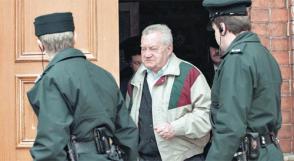By Patricia Casey
Irish Independent
March 20, 2010
http://www.independent.ie/opinion/analysis/patricia-casey-psychiatrists-must-take-share-of-blame-on-abuse-2105623.html
IRELAND -- The debate about whether paedophilia should continue to be regarded as a psychiatric disorder has recently resurfaced
THE name of Alfred Kinsey is associated with two books published in 1948 and 1953 ('Sexual Behaviour in the Human Male' and 'Sexual Behaviour in the Human Female' respectively). The findings he reported astonished and horrified the public while for others it represent a long awaited end to sexual repression.
His studies not only considered intimate issues such as orgasm and masturbation but also opened up taboo subjects including paedophilic attraction. In so doing, he advocated that babies were sexual beings, capable of experiencing orgasm. He even described the behaviours that indicated this.
 |
| Paedophile priest Brendan Smyth leaving Limavady Courthouse in 1997. Smyth was treated numerous times by psychiatrists - all before 1975 |
Kinsey suggested that sexual relations between children and adults were not necessarily harmful and that it was society's attitude that caused the harm. Thus he appeared to give such relations his imprimatur. The debacle occurred when it was alleged that some of his data was based on interviews with paedophiles whose disclosures of child molestation he chose to ignore in the interests of science.
It was another academic, Judith Reisman, who drew attention to the ethically questionable methodology and dangerous conclusions of Kinsey's work. This appears to have been provoked by, among other things, her attendance at a conference in 1977 organised by the British Psychological Association on Love and Attraction. It included among its speakers the head of a paedophile organisation.
The debate about whether paedophilia should continue to be regarded as a psychiatric disorder has recently resurfaced now that the American Psychiatric Association is examining the list of conditions it will classify as psychiatric disorders into the future.
The dangers of removing paedophilia from this list is obvious to most mental health professionals but in 2003 this was debated at the American Psychiatric Association conference and even last year there were still voices being raised in support of its elimination. Removal of paedophilia from the current classification would undercut its current status as a deeply problematic and dangerous form of sexuality and would undermine efforts to maintain its illegal status. Henceforth it would be regarded as simply an ingrained behavioural preference.
Perusing the textbooks of psychiatry that were in use in the 1970s and 1980s, the brevity of sections dealing with paedophilia and the adverse effects of child sexual abuse is striking. This has changed significantly and is reflected in the prominence child abuse is accorded in current journals and textbooks.
Treating the devastating consequences of childhood abuse is now an almost daily feature of modern psychiatry and psychology. The management of child abusers is less often dealt with in detail as this is the realm of specialists in dedicated centres, of which there is but one in this country.
It is clear from the Murphy report and from the information relating to the recent fiasco involving Cardinal Brady that mental health professionals, in this country and outside, were involved in the treatment of many abusers. As is clear from the Murphy report some priests were returned to ministry, sometimes with restrictions, on foot of reports from these professionals.
Brendan Smyth attended Purdysburn Hospital in Belfast, St Patrick's Hospital, Dublin, and a unit in Gloucestershire, all before 1975, followed by out-patient treatment in Dublin, all without any impact on his predatory behaviour. In Purdysburn he was treated with aversion therapy -- the only intervention available at that time and with limited evidence of effectiveness.
Archbishop Martin said on Tuesday evening that the full facts must now be made public. This, in my opinion, includes examination of the role of mental health specialists in treating paedophiles during the years of sexual abuse by clerics that are now the subject of national scrutiny.
And the questions that beg to be answered are numerous and wide-ranging.
How much information was given to the professionals charged with making these assessments in the first instance or was relevant and vital information deliberately not disclosed by the church authorities? Was additional information sought by those treating these men or was the information, limited as it was, accepted at face value?
What treatments were available through the decades of abuse -- was there any evidence for their effectiveness? Is it possible there was naive optimism rather than scientific reality influencing assessments of prognosis?
Was the assessment of insight, remorse and empathy based on the say so of the client/patient or was any objective proof sought? What was the training of those providing treatment? Were detailed reports provided to the bishops on the priest's return to the diocese? Did therapists discuss concerns about the truthfulness of their clients/patients with the referring agents? Were they serving their client, the church, or did they have a wider responsibility to the public?
When information was found that the level of abuse was greater than suspected, was this conveyed to the authorities who needed to know or was confidentiality a wall that could not be penetrated? How many were given a 'clean bill of health'?
Sexual abuse continues to be a huge problem although the focus is now less on clerical and more on familial and non-familial abuse. According to the SAVI report (Sexual Abuse and Violence in Ireland) commissioned by the Rape Crisis Centre and researched by the Royal College of Surgeons in Ireland, one in five women and one in six men reported sexual abuse before the age of 17.
Knowledge that effective treatments are available, that their impact can be objectively measured and that those who need to know will be informed when questions of dangerousness and recidivism arise is essential if a worried and frightened public is to be reassured. Its trust must not be betrayed again.
Any original material on these pages is copyright © BishopAccountability.org 2004. Reproduce freely with attribution.